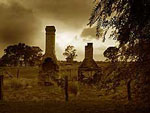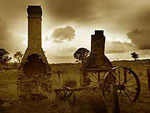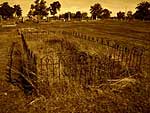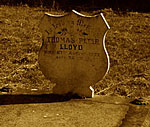

The old Kelly house from their selection at Eleven Mile Creek

The chimney stacks are all that remain of the Kelly's home at Eleven Mile Creek.

Greta cemetery and resting place of Ellen Kelly and Thomas Peter Lloyd

The grave of Thomas Lloyd at Greta
15 April 1878
The beginning of the animosity against the police following the visit of Constable Alexander Fitzpatrick to the Kelly household at Eleven Mile Creek in Greta. Fitzpatrick becomes embroiled in a fight with Dan Kelly and suggests that he has been shot and wounded whilst at the Kelly household.
The real trouble began as a result of a policeman from Benalla called Alexander Fitzpatrick who was despatched to take charge of the Greta police station for a week.
Ned had experienced Fitzpatrick's company before and had punched the policeman in the face when he tried to handcuff him. Fitzpatrick was determined to cause trouble and rode out to the Kelly homestead, against advice, alone to arrest Ned's brother Dan on a horse stealing charge. An argument ensued and Fitzpatrick left to relay his side of the story, no doubt concocted to his own ends, to Benalla on the same night. He claimed that Ned and several accomplices had attacked him at gunpoint, fired several volleys at him and missed, even though Fitzpatrick stated that Ned was at extremely close range. He also maintained that a third shot was fired which hit him in the wrist but Fitzpatrick never received an injury. Mrs Kelly then allegedly attacked him with a shovel which she beat him over the head with denting his helmet. Ned of course denied the scenario vehemently, he had been nowhere near Eleven Mile Creek at the time of the altercation but admitted he had been horse stealing elsewhere.
The story Fitzpatrick made up remained in people's minds even though he was discharged from the force as a liar years later.
Ellen was sent to gaol in Beechworth in 1870 on charges of attempted murder of Fitzpatrick assisted by William Skillion, Ned's bother in law and another man, going by the name of Williamson, each received six years on the charges brought against them.
Dan retreated into the Wombat Ranges accompanied by his two friends Steve Hart and Joe Byrne who had met in Beechworth gaol on horse stealing charges, Aaron Sherritt a long time friend of Byrne's joined them and acted as a courier along with many of the Kelly's friends and supporters.
The sentence imposed on Ned's mother enraged the 23 year old enough for him to vow revenge upon those who had incarcerated her and persecuted his family.
It will pay the government to give justice and liberty to those people who are suffering innocently. They will have to acknowledge that their hounds were barking at the wrong stump and that Fitzpatrick will be the cause of greater slaughter to the Union Jack than St Patrick was to the snakes and toads of Ireland.
The police will rue the day Fitzpatrick got among them. They will know I have been wronged and my mother and those men lagged innocent.
14 MAY 1881
Visit of the Royal Commission on the Police Force of Victoria to Mrs. Ellen Kelly
Reported in The Argus 16 May, 1881, p. 16.
Not included in the Commission's Official Report.
BENALLA, SATURDAY, MAY 14.
On Saturday morning the commission went by road from Benalla to Glenrowan, passing through Greta. En route a short stay was made at the residence of Mrs. Kelly, mother of the late outlaws, Ned and Dan Kelly. Her residence, a four-roomed slab hut, with a bark roof, stands in the middle of a paddock comprising about forty acres. It is within a short distance from a mountain, called Quarry-hill, whence a good view of the surrounding country can be obtained. Within the paddock there were two or three horses and as many cows, and there were a few fowls and a tame kangaroo about the house. But the place presented a gloomy, desolate appearance. There was a very small kitchen garden, but there was no other land under cultivation. Some of the panes of glass in the windows were broken, and, excepting that some creepers had very recently been planted at the foot of the verandah posts, no atempt had been made to beautify the house, or make this home look homely.
When the commission pulled up on the road opposite the front door that door was closed, and there was no sign of any human being about. Presently, however, a child was observed peeping round the back of the house at the strangers. After a short consultation, it was decided that it would be better for the commission, as they were near the house, to ask Mrs. Kelly if she had any statement to make on the subjects that they have been appointed to inquire into. Accordingly, Messrs. Graves and Anderson were told-off to go to the house, and open up communication with Mrs. Kelly. She came round from the back of the house to meet them, and intimated, when she was told of the object of the visit, that she had no objection to see the commission. The remaining members were then called up, and introduced by Mr. Graves to Mrs. Kelly. She was dressed in black, and seemed to be between 40 and 45 years of age. In her younger days she was probably comely, and her hair is still abundant, and black as a raven's wing. Although looking careworn, she has evidently a large stock of vitality. Her eyes and mouth are the worst features in her face, the former having a restless and furtive, and the latter a rather cruel look. When Mr. Graves introduced the other commissioners, Mrs. Kelly said with a smile, "I didn't know who you could all be; I thought it was a circus."
... after a short and rather uncomfortable pause, Mr. Longmore undeceived Mrs. Kelly by informing her that they were the Police Commission, and would be glad to listen to anything she had to say. She did not invite the commisioners into her house, or open the front door; and two or three very young children -- her offspring -- coould be seen inside the house, peering through a window. One of these children was a pretty little girl about four or five years old, and her face reminded one very forcibly of Ned Kelly, whose hair and eyes were of a different colour from his mother's.
Mrs. Kelly made the following statement: --"The police have treated my children very badly. I have three very young ones, and had one only a fortnight old when I got into trouble (referring to her recent imprisonment in connexion with the assault on Constable Fitzpatrick at Greta). That child I took to Melbourne with me; but I left Kate and Grace and the younger children behind. The police used to treat them very ill. They used to take them out of bed at night, and make them walk before them. The police made the children go first when examining a house, so as to prevent the outlaws, if in the house, from suddenly shooting them. Kate is now only about 16 years old, and is still a mere child. She is older than Grace. Mrs. Skillion is married, and, of course, knew more than the others, who are mere children. She is not in the house now. Mr. Brook Smith was the worst- behaved of the force, and had less sense than any of them. He used to throw things out of the house, and he came in once to the lock-up staggering drunk. I did not like his conduct. That was at Benalla. I wonder they allowed a man to behave as he did to an unfortunate woman. He wanted me to say things that were not true. My holding comprises 88 acres, but it is not all fenced in. The Crown will not give me a title. If they did I could sell at once and leave this locality. I was entitled to a lease a long time ago, but they are keeping it back. Perhaps, if I had a lease, I might stay for a while, if they would let me alone. I want to live quietly. The police keep coming backwards and forwards, and saying there are 'reports, reports.' As to the papers, there was nothing but lies in them from the beginning. I would sooner be closer to a school, on account of my children. If I had anything forward I would soon go away from here."
Upon being asked whether any of her children had any complaint to make, Mrs. Kelly knocked at the front door, and called out to her daughter Grace to open it. Grace did so, and after much persuasion on the part of her mother, came to the open door, but speedily retreated behind it. She seems about 14 or 15 years old, and bears a much greater resemblance to her brother Ned than either Mrs. Skillion or Miss Kate Kelly do. Most of the party, seeing that the girl was bashful, withdrew from the house, and then Grace made a statement to Mr. Longmore and one or two others to the effect that one of her brother Ned's last requests was that his sisters should make full statements as to how the police had treated them. She then continued as follows: --"On one occasion Detective Ward threatened to shoot me if I did not tell him where my brothers were, and he pulled out his revolver. The police used to come here and pull the things about. Mr. Brook Smith was one of them. He used to chuck our milk, flour, and honey, on the floor. Once they pulled us in our night clothes out of bed. Sergeant Steele was one of that party."
Mrs. Kelly further stated that when she "came out" her children's clothes were rotten, because of their having been thrown out of doors by the police. The police, also, had destroyed a clock and a lot of pictures, and had threatened to pull down the house over their heads. She was understood to make a statement to the effect that the police had made improper overtures to some of her daughters, but she afterwards said that she had no such charge to make.
The Kelly Family: the Official View
According to the Royal Commission on the Police Force of Victoria, 1881
I -- THE KELLY FAMILY
Amongst the many predisposing causes which operated to bring about the Kelly outbreak must be included the unchecked aggregation of a large class of criminals in the North-Eastern district of Victoria, all of whom, either by the ties of consanguinity or sympathy, were identified with the outlaws. The origin and settlement in the colony of the Kelly family therefore deserves some passing notice at the hands of your Commissioners. James Quin, the grandfather of Edward and Dan Kelly the outlaws, was a native of the County of Antrim, Ireland. With his wife and family, consisting of six children, he arived in Victoria in 1839. He, in the first instance, resided in Pascoe Vale, and earned a susbsistence by the cartage and sale of firewood in Melbourne. In 1845, he settled in Wallan Wallan, in the Kilmore district, where he rented a small farm, and was enabled in the course of a few years to purchase the freehold of 700 acres of land in that locality. In 1863, by which time his family had increased to ten children, four sons and six daughters, he realized the landed property which he possessed, and with the proceeds, amounting to about 2,000 pounds, took up the Glenmore run, situated in a remote part of the North- Eastern district. The precise object of this migration has not been ascertained; but it is believed that Quin, having become notorious as a cattle stealer in the Kilmore district, was desirous of escaping from police surveillance; and, by removing back to the borders of settlement and civilization, to secure for himself and his associates a safer and more extended field of operations....
Numerous progeny was the result of the marriages contracted by the children of the elder Quin, which accounts for the Kelly family being described as the most prolific in the district. James, the third son of old Quin, became an object of interest to the police so far back as 1856; and from that date down to 1879, when he was incarcerated under the Felons Apprehension Act as a Kelly sympathizer, there were recorded against him no less than 16 arrests, and ten convictions for various offences, many of them of a serious nature, involving terms of imprisonment amounting to about nine years.
John Quin, though frequently before the courts, has escaped conviction, but when residing at Wallan Wallan he was regarded by the authorities as the organizer of many of the depredations in which the members of his family were concerned. John Kelly, who married Ellen, the third daughter of the elder Quin, and who was the father of the outlaws, was a convict, having been transported from Tipperary, Ireland, to Tasmania, in 1841, for an agrarian outrage, stated to have been shooting at a landlord with intent to murder. He worked as a bush carpenter for a time after arriving in Wallan Wallan, and subsequently turned his attention to gold digging, at which he was successful, and was enabled to purchase a small freehold at Beveridge. Here he became notorious as an expert cattle stealer, and his house was known as the rendezvous of thieves and suspected persons. In 1865, he was convicted of cattle stealing, and sentenced to six months' imprisonment in Kilmore gaol. He died shortly after his release. At his death he left seven children, namely, Edward and Dan (the outlaws), James, Mrs. Gunn, Mrs. Skillion, Kate and Grace. Mrs. Kelly, upon the death of her husband, settled at Eleven-mile Creek, near Greta, where, with the younger portion of her family, she at present resides. Her place was regarded for years as the resort of lawless and desperate characters, including Power, who is said to have given Ned Kelly his first lesson in bushranging.
Edward Kelly, the leader of the outlaws, was born in 1854 [sic], at Wallan Wallan, and from an early age was regarded by the police as an incorrigible thief. In company with Power the bushranger he, on the 16th of March 1870, robbed Mr. McBean; and on the 25th of Aprilstuck up Mr. John Murray, of Lauriston. Kelly was arrested for the latter offence on the 4th of May following, but escaped conviction owing to want of identification. He was implicated in several outrages; and at Beechworth, in 1871, he received a sentence of three years for receiving a stolen horse. He led a wild and reckless life, and was always associated with the dangerous characters who infested the neighbourhood of Greta until the shooting of Constable Fitzpatrick, on the 15th of April 1878, when he took to the bush.
Daniel Kelly was born in 1861, and from the age of 16 years was, with his elder brother Ned, a noted criminal.
Joseph Byrne, the third outlaw, was born in 1857, and lived with his parents, who, were of Irish extraction and respectable antecedents, at the Woolshed, about seven miles from Beechworth. When 16 years of age he was in trouble, and from the first appears to have developed vicious and cruel propensities. In 1876, along with Aaron Sherritt, who figures so prominently throughout the Kelly campaign, so to speak, and with whom he was on terms of the closest intimacy, he was arrested and sentenced to six months' imprisonment for having stolen meat in his possession; and was also believed to have been connected with numerous cases of horse stealing in the North-Eastern district, which ultimately led to his joining the Kelly gang.
Steve Hart, the fourth member of the gang, was born in 1860, and was the second son of Richard Hart, of Three-mile Creek, near Wangaratta. Stephen, at an early age, became the associate of disreputable persons, and carried on a system of stealing horses and planting them until such time as rewards were offered by the owners for their recovery. He received a sentence of imprisonment in July 1877, and subsequently was sent to gaol for ten months for horse stealing. On his release he returned to Wangaratta, and for a time appeared disposed to lead a more honest and reputable life. One day, however, while at work cutting timber, he suddenly threw down his axe, exclaiming to his mate. 'A short life and a merry one." He then rode off, stating that he was going to New South Wales. Nothing further was heard of him until the murders of the police at the Wombat, when it was reported that a man answereing to his description was seen near Greta; but it was not until the Euroa bank robbery that his identity was established as one of the accomplices of the murderers, Ned and Dan Kelly.
Source: "Royal Commission on the Police Force of Victoria: Second Progress Report", in Victorian Parliamentary Papers, 1881, Vol. 3, pp. 3ff.
Reprinted in Don Gibb, The Kelly Outbreak: Reader, Deakin University, 1995, p. 16. Section 8, pp. 5-6.
18 April 1868
James 'Jim' Kelly is sentenced to death for burning down the house of the Lloyd family in Greta. His sentence is later reduced to 15 years in prison.
1 December 1868
The Greta common school opens. Daniel Kelly is later a pupil.
9 April 1869
Annie Kelly marries Alex Gunn.
June 1869
Bill Frost begins a friendship with Ellen Kelly, one which culminates in him promising to wed her.
10 October 1869
Chinaman Ah Fook visits the Kelly home at Greta. An altercation takes place and Ah Fook accuses Ned of assaulting him and stealing money. Kelly denies the charge.
March 1870
Ellen Kelly is charged with procuring Sly Grog (home brewed liqour) and is bailed to appear 9th May,
9 May 1870
Ellen Kelly is acquitted of selling sly grog (home brewed liqour).
March 1871
Ellen Gunn dies at her home in Greta.
April 1871
Ned Kelly is arrested by Senior Constable Edward Hall at Greta and charged with horse stealing, which Ned Kelly denies. According to Kelly he borrowed the horse legitimately.
January 1872
Ellen Kelly, a child born to Ellen Kelly and Bill Frost dies in Greta.
2 January 1872
Annie Gunn (nee Kelly) moves in with the family at their Greta Home in Eleven Mile Creek.
11 November 1872
Annie Gunn (nandeacute;andeacute; Kelly) dies at Eleven Mile Creek on the outskirts of Greta.
March 1878
Arrest warrant issued for Ned Kelly on a charge of horse stealing.
15 April 1878
The beginning of the animosity against the police following the visit of Constable Alexander Fitzpatrick to the Kelly household at Eleven Mile Creek in Greta. Fitzpatrick becomes embroiled in a fight with Dan Kelly and suggests that he has been shot and wounded whilst at the Kelly household.
26 April 1878
Ellen Kelly, William Williamson and William Skilling are charged with affray at Greta.
14 MAY 1881
Visit of the Royal Commission on the Police Force of Victoria to Mrs. Ellen Kelly
22 JANUARY 1896
Margaret 'Maggie' Kelly dies at Greta.
27 MARCH 1923
Ellen Kelly (nee QUINN) dies at Greta.
27 AUGUST 1927
Close friend and cousin of Ned Kelly, Thomas Peter Lloyd, dies at Greta, Victoria.
3 MAY 1940
Grace Kelly dies at Greta.
18 OCTOBER 1946
James Kelly dies at Greta.
1. Greta School
2. Greta Cemetery
3. Kelly selection at Eleven Mile Creek

The Ned Kelly Trail - Greta
The Ned Kelly Trail Stop 6
Not much remains of the Eleven Mile Creek house today save the red brick chimneys.
Sadly, access to the original site is non-existent and there are no end of Trespassers will be prosecuted signs to ward off the curious.
Viewing from the road requires binoculars or a zoom lens on your camera.
The homestead site is about 15km outside of Glenrowan on a dirt road which connects Greta south with Benalla.
Greta School
Greta is a small township about 15km from Glenrowan and the place where the Kelly family settled before Ellen made her selection at Eleven Mile Creek.
Ned's brother Dan went to school here. The school is situated next door to Greta cemetery where Ellen Kelly, Thomas Peter Lloyd and many other 'Kelly people' are buried.
The school andamp; cemetery are in West Greta.
Greta Cemetery
Greta cemetery is where Ned's mother Ellen Kelly (nee Quinn) is buried along with the alleged fifth member of the Kelly Gang Thomas Peter Lloyd.
The cemetery is situated adjacent to the Greta school at the crossroads in West Greta.
Eleven Mile Creek
The old Kelly House. All that remains are the chimney stacks of the house.
thenedkellytrail.com ©2004-2025